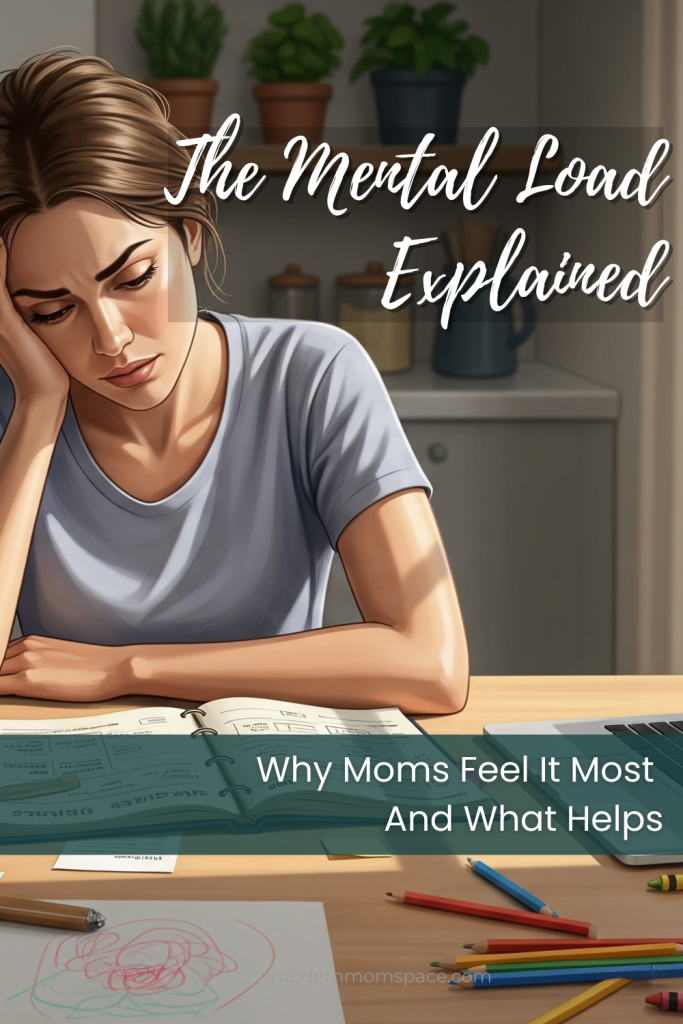How to Lighten Your Mental Load as a Mom (Without Dropping the Ball)
“Why does it feel like I’m the only one who notices everything?”
If you’ve ever thought that while staring at a laundry pile, checking your kid’s school emails, or remembering to buy toothpaste for the third week in a row, you’re not alone. That invisible juggling act has a name: the mental load of motherhood.
A 2023 survey from Pew Research Center found that women, especially mothers, still carry most of the planning, scheduling, and invisible coordination at home—even in households where chores are shared. It’s not just about dishes or laundry. It’s about holding every detail in your head, all the time.
This article breaks down what mental load really means, why it matters, and most importantly, how to lighten it without letting anything crash to the ground.
What Is Mental Load?
Mental load definition: The mental load is the invisible, constant work of anticipating, planning, and managing household and family needs.
It includes things like:
The mental load is different from physical chores. Folding laundry is a task. Remembering that your child needs a clean uniform tomorrow is the mental load.
Researchers call this “cognitive labor.” A study published in Sex Roles found that women report doing the majority of this unseen planning work, even when their partners help with visible chores.
Why the Mental Load of Motherhood Hits So Hard
Being a mom means you don’t just “do things”—you remember, anticipate, and direct things constantly. This is where the weight piles up.
This is why many women describe mental load as exhausting. It isn’t just “being busy.” It’s living in a constant state of alertness, scanning for what could go wrong.
Signs You’re Carrying Too Much Mental Load
You might be juggling too much if you notice:
If that feels familiar, you’re not broken. You’re carrying the invisible mental load of motherhood.
The Cost of Carrying It All Alone
Carrying this load long-term leads to burnout, resentment, and guilt. Studies link women’s cognitive labor to lower relationship satisfaction and higher stress. Over time, it erodes well-being and contributes to what many moms call “mom burnout.”
We’ve written more about recovery in this step-by-step burnout guide. But the truth is, avoiding burnout starts with not holding the entire mental load alone.
How to Lighten Your Mental Load (Without Dropping the Ball)
Here’s the good news: lightening your load isn’t about lowering your standards or letting your family fall apart. It’s about shifting how the load is shared, stored, and managed.
1. Make the Invisible Visible
Start by writing down everything you carry in your head for one week. This “mental load inventory” might include school emails, permission slips, meal plans, and family birthdays. When your partner or kids see the sheer list, it becomes real—not just “in your head.”
2. Shift From Manager to Partner
Many moms fall into the role of project manager, delegating tasks but still tracking all the details. True relief comes when your partner takes ownership of entire categories—like being fully in charge of kids’ sports schedules or meal planning.
3. Use Tools That Take the Weight Off Your Brain
Tools don’t fix imbalance, but they remove the need to “just remember everything.”
4. Redefine “Good Enough”
You don’t need to bake from scratch for every class party. A store-bought tray is fine. The goal isn’t to do everything perfectly—it’s to create space for yourself to breathe.
Quick Reset: A 3-Minute Load Check
When you feel the overwhelm building, pause and run this checklist:
- What am I holding that someone else could own?
- What can I outsource to a tool, list, or reminder?
- What can I let go of without real harm?
This 3-minute pause often prevents a spiral into resentment or exhaustion.
Practical Examples of Sharing the Mental Load
Here are some real-life shifts moms have found helpful:
The key is ownership, not assistance. It’s not about help with your system—it’s about building a shared system.
The Emotional Side: Letting Go of Control
Here’s the hardest truth: sometimes the reason the load doesn’t shift is because we won’t let it. We fear things won’t be done “right.”
But “different” isn’t wrong. A partner may fold clothes differently, pack simpler lunches, or forget a nonessential step. That’s okay. The long-term gain of shared mental load is worth the short-term discomfort of things being done another way.
When Mental Load Overlaps With Mom Guilt
Moms often feel guilty for even wanting relief. Shouldn’t we be able to handle it? Shouldn’t we be grateful?
That guilt is a trap. We’ve explored it in detail in this guide on working mom guilt. The short version: carrying everything doesn’t make you a better mom. Modeling balance makes you a healthier one.
A Gentle Reminder
If you’re reading this while exhausted and overwhelmed, take this as permission: you don’t need to hold it all. Lightening your mental load isn’t about weakness. It’s about sustainability.
Final Takeaway
The mental load of women—especially the mental load of motherhood—is real, heavy, and often invisible. But you don’t need to live on the edge of burnout. By naming it, making it visible, sharing ownership, and using tools, you can finally step out of the role of household manager and back into being a full human being.
Your family doesn’t just need you to “manage.” They need you to be well.
FAQs on the Mental Load of Motherhood
What is the mental load of motherhood?
The mental load of motherhood is the invisible work of anticipating, planning, and managing family life. It includes remembering schedules, organizing routines, and anticipating needs—beyond physical chores.
How can moms reduce their mental load?
Moms can reduce their mental load by making invisible tasks visible, sharing full ownership of responsibilities with partners, using tools like shared calendars, and redefining “good enough.”
Why is the mental load heavier for women?
Studies show women, especially mothers, often carry more of the mental load due to cultural expectations, gender norms, and habit. Even when chores are shared, planning and emotional labor often default to women.








